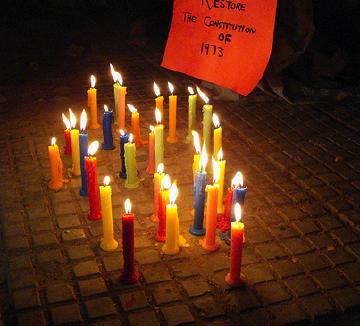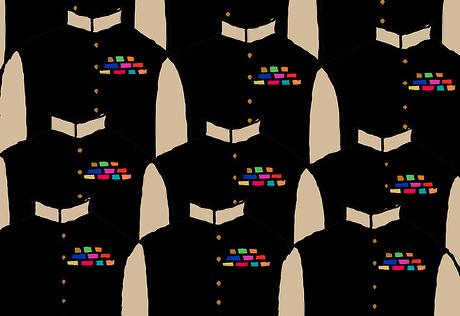Adil Najam
Today, December 10, marks the World Human Rights Day. The theme for this year’s World Human Rights Day is Dignity and Justice For All of Us. One could not possibly think of a more tragic reminder of the state that our country has descended into. It is easy, perhaps too easy, to focus only on the dimensions of injustice and indignity that are highlighted by Pakistan’s current political crises. The reality, however, is that the scars of economic indignity and economic injustice run even deeper.
The sad news is that he state (i.e., the government apparatus) has turned Pakistan into the land of indignity and injustice. The good news is that, divided as it is, society continues its struggle for dignity and justice. The State, with all the recourses that it has at its command, continues to employ ever harsher instruments of control leading to ever greater indignities and injustice for the citizenry. The resilience of society, however, stands tall and speaks out loud. At least for now.
And that is the great question that stares at us on this World Human Rights Day. Will the State’s instrumentality of oppression triumph over Society’s resilience and quest for dignity and justice?
I wish I could be as optimistic as I have been in the past, but right now its a 49-51 proposition and I do not know which side has the 51. I root, however, as I always have for society’s resilience which, even when beaten down, has a way of rising again and again despite the odds in what remains, in my view, a democratic society trpped within an undemocratic state.
The evidence is spread all over this blog and elsewhere. But it remains inconclusive.Society’s desire for justice and dignity is clear, it was best exemplified in the aftermath of was was labeled the ‘CJ Crisis‘ and the triumph of the popular movement to restore the Chief Justice gave great sustenance to civil society. But the same spirit has been seen in other areas ranging from citizen demands to save the Karachi coastline to the more recent civil society rising by journalists, lawyers and students. The government’s ability to take ever-harsher and ever-more stringent actions whether against those protesting against their ‘missing’ relatives or against lawyers and judges or against the media or against political opponents is also not in doubt. But what makes this a more difficult situation to call is the silence, even connivance (here and here), of the political parties who have either remained missing in action in most of the great struggles of recent months or have chimed in conveniently but often in ways that were “too little and too late.” Also disturbing is the violent streak within society that bursts out most disturbingly amongst those on the religious extremes but sometimes also inflicts (although, till now, at much much lower levels) those with more liberal agendas (here and here). It only serves to delegitimize even the legitimate aspects of their agendas.
 If any place in the world understand, Pakistan understands that the struggle for human rights, for dignity and for justice cannot be confined to just one day. It cannot be a political movement of a moment. Of a certain profession or of a certain class or a certain grouping. It has be to a struggle in perpetuity and a struggle of society as a whole. And therein lies the real dilemma of a deeply divided society such as our own.
If any place in the world understand, Pakistan understands that the struggle for human rights, for dignity and for justice cannot be confined to just one day. It cannot be a political movement of a moment. Of a certain profession or of a certain class or a certain grouping. It has be to a struggle in perpetuity and a struggle of society as a whole. And therein lies the real dilemma of a deeply divided society such as our own.
The question for today is about civil society’s protest against the State’s human rights record and how the State will respond to these protests. In the grand scheme of things, however, we shall be judged by history not only by what happens to a certain general, a particular political party, a bunch of judges, a group of TV channels or a movement of lawyers. History shall judge us by whether we as a State and as a Society were able to restore and respect the dignity of and justice for the ordinary citizen – dignity and justice in all its dimensions: political, economic, social, and more. Whatever struggles we partake in today, that and that alone, must be the ultimate goal.



















































ATTA though sounds like TADA, anti-terrorism act, has nothing to do with terrorism or law. Though it is not an anti-terrorism act yet it has same terrorising affects for ordinary citizens of Pakistan.
It is one of the great marketing and economic skills of General (Retired) Musharraf’s regime that soon ATTA will be one of the luxury items in Pakistan. Few years back ATTA was consider one of the cheapest commodities in Pakistan. Now a days if you ask the same question the answer would be the constitution of Pakistan, the cheapest commodity in Pakistan. And if you are a COAS do whatever you want with it nobody cares about. It has become the most worthless piece of document in Pakistan.
If ATTA had any thing to do with supreme court, lawyers, Constitution or media we would have seen Musharraf regime working over time to arrest its ascendancy by using all its might.
ATP,
@ what a contradiction between Human Right’s blog
and Hoodbhoy’s blog which is just the opposite.
This is called Hypocracy of colonials.
I am so furious to learn that Musharraf is removing the ban on third term for PM.
Thants it!, he has lost my support from now.
One of the biggest irony of current Administration in Islamabad is that it even has a Human Rights division and the caretaker minister of the division is Ansar Burney, known for his work on prisoners’ rights.
On the World Human Rights Day he spent time visiting jails. But it never occurred to him to question why the sacked judges are under continued house arrest along with their families. And why are the most prominent lawyers of Pakistan are still in jails or under house arrests?
Hey, The News just carried a version of this post, and with attribution. See here:
http://thenews.jang.com.pk/daily_detail.asp?id=858 27